Meet the Instrument Solution Group, Metro’s Data Curators

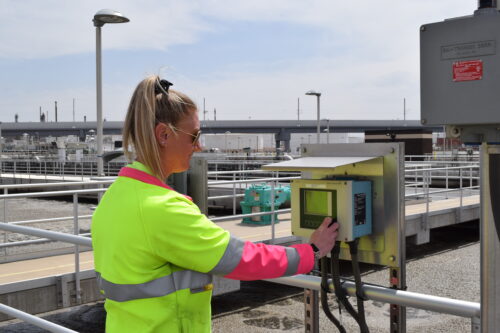
When your water goes down the drain, countless individuals with technical and scientific expertise work tirelessly to treat and recover this water. Metro Water Recovery’s treatment facilities operate 24/7, 365 days a year to recover wastewater as we preserve and protect the health and environment of the region. Clean water leaders like Metro succeed through cutting-edge treatment processes and technologies. But did you also know that our work is supported by a stream of real-time data, which allows Metro to assess and react to changing conditions of treatment systems?
None of this work could happen without the dedication of Metro’s operational and support staff. These employees work to monitor, control, and optimize our processes. Meet Metro’s very own Instrument Solution Group (ISG), who is tasked with monitoring and assessing critical data on our treatment processes. You can think of the ISG as Metro’s data curators and facilitators. The ISG selects, installs, and maintains devices that record real-time data that allow employees to monitor processes as wastewater moves through our facilities for treatment. Employees working in Metro’s ISG calibrate, maintain, and ensure the accuracy and precision of these vital devices.
You can think of the ISG as Metro’s data curators and facilitators. The ISG selects, installs, and maintains devices that record real-time data.
Lab Data vs. Real-Time Data: What’s the Difference?
At Metro, there are two different types of data: laboratory data and real-time data. Laboratory data is essential to understanding the biologically and chemically complex wastewater treatment process. Samples are collected then taken to the lab for analysis. This data is used for process control decisions, capital planning, and demonstrating permit compliance. However, a lab sample taken from the process only offers a snapshot of conditions only at the time of the grab. Relying on laboratory analyses alone is not practical due to the increasing complexities of systems and the demands of increasingly stringent effluent quality requirements.
Real-time data is just what it sounds like: continuous data recorded throughout our treatment processes. Instruments and devices – such as probes, instrument panels, and software – deliver data in real time, which can be used to inform changes in our operations. Metro’s ISG is tasked with the important responsibility of managing these instruments, in turn providing real-time data and empowering our organization with the data we need to perform our important mission.
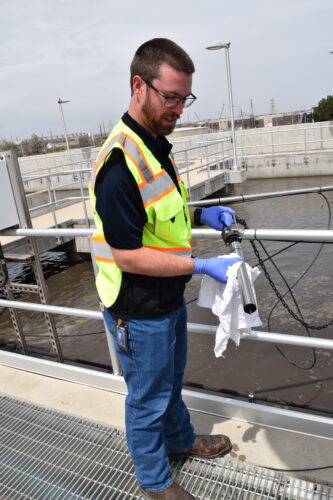
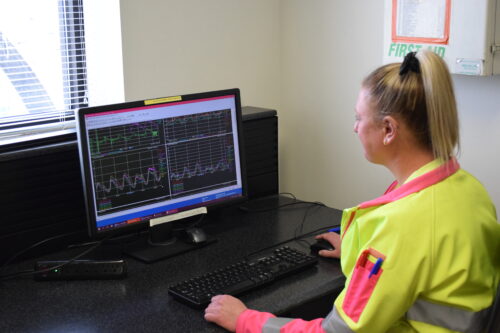
Day to Day Duties of an Instrumentation Specialist
Instrument Specialists are required to possess a wide range of skills and knowledge. Specialists need to be experienced scientists due to the critical and varied nature of their work. In fact, Specialists must be versed in laboratory analysis and data analytics while also being mechanically inclined. Specialists concentrate on instrument applications, developing and implementing preventative maintenance procedures, customizing calibrations, and responding to customer needs. This is physical work with exposure to the elements, followed by a transition to the office to perform data analysis and administrative tasks.
Instruments and Analyzers
Metro’s ISG utilizes 250 instruments that provide 325 different distinct data sets on parameters such as nutrient and solids concentrations, pH, and dissolved oxygen (DO). These instruments fall into two categories: extractive analyzers which pull a sample from the process and perform analysis at the analyzer, and in-situ analyzers which are submerged into the process.
Each analyzer type offers their own advantages. Extractive analyzers are more precise but require well-designed sampling systems to ensure that a representative sample is collected. This can be challenging due to the nature of wastewater and the commonly small sample tubing used. These analyzer types can also be costly. In-situ analyzers are quickly installed, eliminate a sampling system, and are less expensive. However, in-situ analyzers do not provide the same analytical performance or stability as extractive analyzers.
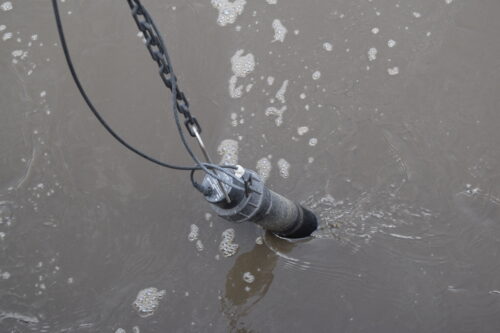
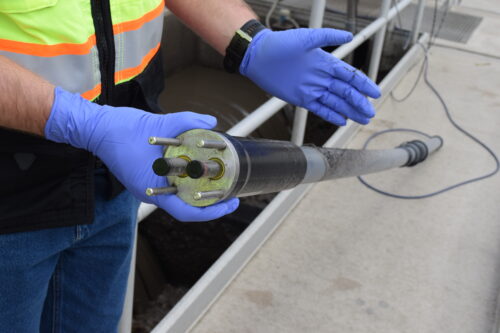
Responding to Challenges through Innovative Pilot Projects
The complexities of wastewater treatment — in addition to increasingly stringent treatment requirements — present unique challenges to clean water utilities. In response, Metro’s ISG often collaborates with instrument manufacturers to address unique or particularly challenging applications. These partnerships are mutually beneficial endeavors that result in better data for Metro and real-life product demonstration for the manufacturers. Past collaborations have resulted in successful analysis of low levels of peracetic acid (PAA) for the disinfection system, soluble chemical oxygen demand (COD) analysis in gravity thickener effluent, and low-level ammonia (NH3) analysis with ion selective electrodes. The ISG is currently running several studies and pilots to support process optimization efforts. An extractive E. coli analyzer, the Coliminder, is being trialed in the secondary effluent prior to disinfection to adjust the dosing of the costly PAA based on changing levels of E. coli to better react to changing conditions.
At the soon to be commissioned Solids Processing Building, the ISG is working on a combination of instruments to measure solids in the sludge feed, centrate, and cake from the new centrifuges that would allow the Operations and Engineering teams to optimize centrifuge performance and polymer usage. Additional efforts are numerous and include:
- Optimization of the MagPrex reactor through the use of orthophosphate (OP) measurement in the centrate for automated feedback magnesium dosing
- DO instrument optimization study to decrease maintenance and improve aeration control efficiency
- Study of the ammonia loading imbalances between basins in the south aeration system to inform future control requirements
Real-time data is key for understanding current conditions and enables our operators to react quickly to changes. The industry is also moving in the direction of data and models that can predict upsets and allow for proactive, instead of reactive, decisions. The ISG works to ensure both the current and future success of our organization as they provide critical, real-time data. Instrumentation Specialists serve the important role of data curators and facilitators as they empower employees across Metro to perform their duties, ensure compliance, and protect the environment.
